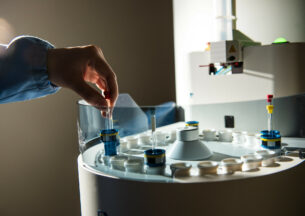Crunchbase Features “Self Aware Computing” Framework Developed by Hank Hoffmann
Machine learning has revolutionized the way computers solve problems, transforming data into smarter decisions in fields from medicine to engineering to transportation. But there's still room for improvement, technologies that can boost the performance of machine learning models or make them more resilient to abrupt changes in data or hardware. Self-Aware Computing, a framework developed by UChicago CS assistant professor Henry “Hank” Hoffmann, helps machine learning models think “on the fly,” rapidly adjusting to adverse conditions and new information.
Tech news site Crunchbase recently visited the Ryerson Laboratory to learn more about the “Hoffmann Optimization Framework,” or HOF, discussing its applications for autonomous vehicles, mobile phones, and molecular dynamics simulations.
Rather than asking a machine-taught system to re-learn everything when something unexpected happens, HOF takes what the system already “knows” about its limits, its theoretically optimal behavior, and the variables (the “virtual knobs”) that affect its performance to find the best way to operate given the context of its environment.
Our hypothetical car mentioned earlier wouldn’t need to re-learn how to drive with three functional tires, or how to “see” with partial blindness. A drone that’s far from its base could operate at a different speed or trajectory to ensure that it has sufficient battery life to make it home. It wouldn’t need to re-learn how to fly, this time with half a battery. Multi-core computers, or servers in a data center, could reduce energy expenditure by more efficiently allocating computational resources or adjusting fan speeds under heavy load. In a complex system with many layers of subsystems, having HOFs all the way down the stack would make the whole system run more efficiently.
The piece also discusses efforts to commercialize the framework, bringing its flexible potential to customers in government and industry. You can read the rest of the article at Crunchbase, as well as view a paper from this year's ASPLOS conference on using Hoffmann's framework to improve performance of Hadoop, Cassandra, and other popular software.












